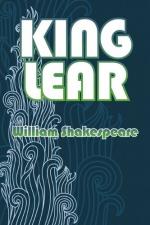|
This section contains 5,392 words (approx. 18 pages at 300 words per page) |

|
SOURCE: "Earthy Doom and Heavenly Thunder: Judgement in King Lear," in The University of Dayton Review, Vol. 23, No. 2, Spring, 1995, pp. 63-73.
In the essay that follows, Green studies the references to both secular and divine law and judgement in King Lear, arguing that through such intimations, Shakespeare heightens the experiences of cruelty, hopelessness, and pain in the play as well as intensifies the force of the play's final tragic scene. Green examines in particular how Shakespeare's audiences may have perceived such dramatic events.
In King Lear (1605-1606) Shakespeare refers to the law and to judgment, both secular and divine, again and again, heightening the pressure and force of the tragic outcome. The repeated legal situations, rather than offering hope of a fair judicial decision or a merciful reprieve, intensify and mirror the characters' experiences of heavenly wrath, human cruelty, and hopeless pain.
It is illuminating to recapitulate as...
|
This section contains 5,392 words (approx. 18 pages at 300 words per page) |

|


